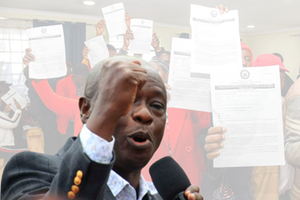Israel marks one year anniversary since first attack on Gaza

A woman reacts as she takes part in a march towards Israeli Prime Minister Benjamin Netanyahu's private residence, to mark one year since the deadly October 7 attack by Hamas, in Jerusalem, October 7, 2024.
Israelis on Monday marked the first anniversary of the devastating Hamas attack that triggered a war which has sparked protest worldwide and risks igniting a far wider conflict in the Middle East.
Ceremonies and protests in Jerusalem and Israel's south were scheduled to begin around 06:29 a.m., the hour when Hamas-led militants launched rockets into Israel at the start of the Oct. 7 attack last year.
They killed some 1,200 people and took about 250 hostages to Gaza, according to Israeli figures.
Security forces were on high alert across the country on Monday, the military and police said, anticipating possible Palestinian attacks planned for the anniversary of Oct. 7, 2023, when the worst bloodletting in the decades-old Israeli-Palestinian conflict began.
The Hamas attack on Israeli communities around Gaza and Israel's relentless campaign in response have destabilised the Middle East while the scale of the killing and destruction have horrified people worldwide.
Outside Israel, demonstrations are expected around the world against its offensive in the Gaza Strip which has laid waste the densely populated coastal enclave, killed almost 42,000 people, according to Palestinian health authorities, and displaced most of the 2.3 million population.
For Israel, the surprise assault by the Palestinian Islamist group was one of the worst security failures for a country that prides itself on a strong, sophisticated military.
The attack led to Israel's single deadliest day, shattered many citizens' sense of security and sent their faith in its leaders to new lows.
Most of the dead were civilians, including women, children and elderly people, killed in their homes, on the roads and at the site of an open air music festival - as well as soldiers on army bases near the Gaza border.
In Gaza, 101 hostages remain as Israeli forces press on with their mission to end Hamas' rule of the enclave and demolish its military capabilities.
But the focus of the war has increasingly shifted north to Lebanon where Israeli forces have been exchanging fire with Hezbollah since the Iranian-backed group launched a barrage of missiles in support of Hamas on Oct. 8.
What began as limited daily exchanges has escalated into bombardments of Hezbollah's stronghold in Beirut and a ground offensive into border villages meant to stamp out its fighters there and allow tens of thousands of Israelis evacuated from their homes in the country's north to return.
Israel's assault, which has killed well over 1,000 people in the past two weeks, has triggered a mass flight from southern Lebanon where more than 1 million people have been displaced.
A series of Israeli assassinations over the past few months which killed Hezbollah and Hamas chiefs and a sophisticated attack on Hezbollah via pagers and radios have restored some sense of security for Israelis.
But they also prompted unprecedented missile attacks from Iran, raising fears of a regional war with a powerful enemy. Israel has yet to respond to the second Iranian barrage on Oct 1, but has vowed a harsh response.





